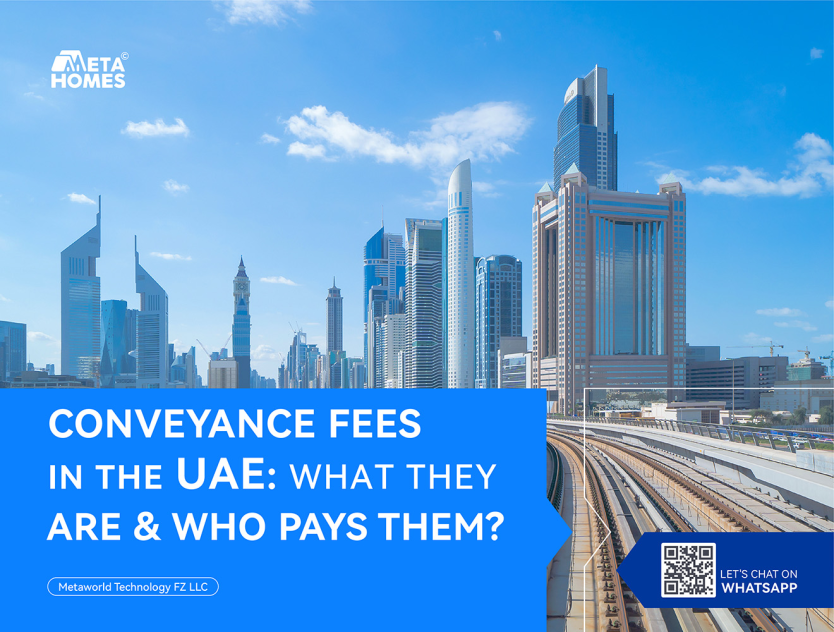
Buying or selling property in the UAE involves more than agreeing on a price. You’ll also face various property costs, chief among them the conveyancing or “conveyance” fees. These cover the legal and administrative work of transferring ownership—and they can add several thousand dirhams to your budget. Whether you’re a first-time buyer, an investor, or even selling your property, knowing what these fees are, how much they cost, and who is responsible for paying them can help you plan your finances better and avoid any last-minute surprises.
What Exactly Are Conveyancing Fees?
Conveyancing is the process of legally transferring a property title from seller to buyer and understanding the UAE’s property ownership laws is essential for a smooth transaction. It involves drafting and reviewing contracts, obtaining approvals from developers and government bodies, handling payments, and registering the new ownership. A conveyancer (or property lawyer) ensures every “i” is dotted and every “t” is crossed, protecting both parties from legal pitfalls.
Conveyancing fees are the charges you pay to professionals who handle this process for you. These professionals—often called conveyancers or property lawyers—manage all the legal documentation, coordinate with government entities like the Dubai Land Department (DLD), and ensure everything is done correctly and on time.
While hiring a conveyancer in Dubai is not mandatory, most people do it because the process can be complicated. The cost of conveyancing becomes part of your UAE property costs, and it’s an important one to consider.
Why Conveyancing (and Why You Shouldn’t DIY)
You might wonder: “Can’t I just fill out the forms myself?” Technically, yes. Hiring a conveyancer in Dubai isn’t mandatory. But consider:
1. Legal Compliance
UAE real estate law is detailed, with multiple RERA/DLD regulations to follow. A single misstep—missing a deadline, filing the wrong form—can delay your sale by weeks or even months.
2. Developer & Bank Requirements
To obtain your No Objection Certificate (NOC), to secure or settle a mortgage, and to register Ejari for renting, you must navigate specific procedures. Conveyancers handle these seamlessly.
3. Error Mitigation
Errors in payment transfers or title deed registration can trigger penalties or place your ownership at risk. A professional spreads that risk.
4. Time Savings
You avoid trips to the Land Department or typing centers, and you free up your own time to focus on moving, renovation, or simply living your new life.
All told, conveyancing fees buy you peace of mind—and they’re frequently a worthwhile investment.
What Services Are Included in Conveyancing?
While packages differ, a typical conveyancing engagement covers:
-
Review & Drafting of SPA
Ensuring the Sale & Purchase Agreement reflects agreed terms, protects your interests, and complies with Law 26/2007 and its amendments.
-
Title Deed Transfer
Submitting required documents to the Dubai Land Department (DLD) or relevant emirate authority and obtaining the new title in the buyer’s name.
-
Developer NOC
Liaising with the original developer to secure the No Objection Certificate, proving there are no outstanding service charges or mortgage liens.
-
Mortgage Coordination
If financing, coordinating with banks to settle existing mortgages and lodge new ones, including discharge letters.
-
Government Registration Fees
Calculating, submitting, and paying DLD transfer fees (4% of sale price plus AED 580) and Ejari registration (as needed for rented units).
-
Utilities & Ejari
For investors renting out the property, registering the contract under Ejari to connect DEWA, Etisalat, and Du.
-
Final Settlement & Fund Transfers
Managing escrow or trust‑account arrangements to move the full purchase price from buyer to seller on handover day.
-
Post‑Completion Support
Resolving any title deed queries or developer follow‑ups, often for a specified warranty period.
By bundling these tasks, conveyancers ensure no step is missed—and you avoid having to coordinate five or six different parties yourself.
Detailed Breakdown of Conveyancing Fees
When budgeting for UAE property costs, factor in these components:
| Fee Type | Description | Typical Cost |
| Conveyancer’s Professional Fee | Legal and admin work—fixed fee or small percentage of property value. | AED 5,000–AED 15,000 |
| Registration Fee | Government fee to register new ownership under DLD or equivalent authority. | AED 2,100–AED 4,200 |
| DLD Transfer Fee | 4% of sale price + AED 580 admin fee | 4% + AED 580 |
| Developer NOC Fee | Issued by the property developer to confirm no outstanding dues. | AED 500–AED 5,000 |
| Mortgage Settlement Fee | Coordination with bank to close existing mortgage and register new one (if applicable). | AED 1,000–AED 3,000 |
| Ejari Registration | If renting out the unit, registering the tenancy under the Ejari system. | AED 195 |
| Teaching/Typing Center Charges | If documents are processed through third‑party typing centers (Ejari, NOC applications). | AED 100–AED 300 per service |
| Miscellaneous Administrative Fee | Courier charges, additional searches, transcription of foreign documents, additional Notary services. | AED 200–AED 1,000 total |
Conveyancer’s Professional Fee
- Fixed: Many firms charge a flat fee (e.g. AED 7,500) that covers all standard services.
- Percentage: Others charge a percentage of the sale price (commonly 0.25–0.5%), which can be more expensive for high‐value properties.
Registration & Transfer Fees
- The DLD’s 4% plus AED 580 is non‐negotiable and is by far the largest single government charge. Buyers usually pay it, though in some deals seller and buyer agree to split it.
Developer NOC Fees
- Developers each have their own NOC schedule—some charge a flat AED 500, others scale up to several thousand dirhams for larger villas. Always check with the developer’s sales office.
Who Pays Conveyancing Fees?
- Buyer: In most residential deals, the buyer covers the conveyancer’s fee, registration fee, and DLD transfer fee.
- Seller: Sometimes the seller agrees to pay part of the conveyancer’s fees to make their listing more attractive—common in a buyer’s market.
- Split or Custom: In commercial or negotiation‐heavy deals, costs can be split or allocated differently by mutual agreement.
Regardless of tradition, every cost must be spelled out in the SPA. Never assume “the market” dictates who pays; confirm in writing.
How to Choose the Right Conveyancer
Picking the cheapest option can backfire. Look for:
1. Experience & Specialization
Have they handled dozens of similar transactions? Do they specialize in residential or commercial property?
2. Reputation & Reviews
Check online reviews, LinkedIn profiles, and ask colleagues for referrals.
3. Full Costs Upfront
Request a written, all‐inclusive quote. Avoid “additional charges apply” clauses.
4. Clear Communication
You want regular updates, transparent timelines, and someone who explains legal terms in plain language.
5. Licensing & Accreditation
Verify they’re registered with the relevant Dubai or UAE legal/regulatory bodies.
Choosing well can save you thousands in hidden fees and weeks of delays.
Tips to Save on Conveyancing Costs
1.Opt for a Fixed Fee
Especially on high-value deals, a flat AED 10,000 conveyancer fee beats 0.5% of a multi-million-dirham sale.
2. Bundle Services
If you’re selling and buying simultaneously, some firms offer package discounts for handling both transactions.
3.Plan Ahead
Last‐minute “urgent” filings at typing centers often charge premiums. Start the process early.
4.Negotiate NOC Fees
Some developers will waive or reduce NOC charges if you have a good relationship or a portfolio of transactions with them.
5.Avoid Excessive Extras
Decline translation or notarization services you don’t need—many documents can be self‑certified or use UAE Government initiatives like the MBR eNotary.
A Step‑by‑Step Timeline of Conveyancing
1.Offer & SPA Drafting (1–3 days)
You and the seller agree on price; conveyancer drafts the SPA.
2.NOC Application (3–10 days)
Conveyancer requests NOC from developer.
3.Mortgage Coordination (if any) (5–20 days)
Submit bank documents; bank issues mortgage approval and settlement figures.
4.Document Submission to DLD (Same day)
Once NOC arrives, conveyancer files final SPA, title deed documents, and payments online.
5.DLD Transfer & Title Handover (1–3 days)
DLD processes transfer; new title deed printed and handed over.
6.Ejari Registration (if rented – 1 day)
New tenancy contract registered for utility and visa purposes.
Total Time: Typically 2–4 weeks for a smooth residential transaction; 4–6 weeks if financing is involved.
Common Pitfalls & How to Avoid Them
- Missing Deadlines: Always note NOC expiry dates (often 30–60 days).
- Incorrect SPA Terms: Double‑check every figure, payment schedule, and special clause.
- Unpaid Service Charges: Sellers must settle service fees before a clean title deed transfers. In rare cases of developer issues or stalled projects, you may also want to understand your rights. Read our breakdown on buyer refunds for cancelled real estate projects.
- Unregistered Ejari: Leads to delays in DEWA/Etisalat connections or visa applications.
- Hidden Fees: Confirm all typing center charges and admin costs up front.
Vigilance at each step prevents costly delays and disputes.
FAQs
-
What Are Conveyancing Fees in Dubai?
Conveyancing fees in Dubai typically range between AED 5,000 and AED 15,000 for residential properties, depending on the complexity of the transaction. Commercial transactions can be more expensive.
-
Who Pays Conveyancing Fees in the UAE?
Usually, the buyer pays the conveyancing fees, but the payment can be negotiated between buyer and seller. Sometimes both parties hire their own conveyancers and pay separately.
-
Is It Mandatory to Hire a Conveyancer in Dubai?
No, it’s not mandatory, but it’s highly recommended. Property transactions involve legal documentation and compliance with local regulations, so having a professional helps prevent costly errors.
-
Can I Save on Conveyancing Fees?
Yes. Choose a fixed-fee package, get multiple quotes, and ensure the quote is all-inclusive. Don’t go for the cheapest option without checking reviews and qualifications.
-
What’s the Difference Between DLD Fees and Conveyancing Fees?
DLD fees are government charges for registering the property, including the 4% transfer fee. Conveyancing fees are the charges you pay to a legal professional for handling the entire property transfer process.
PS. Choosing an experienced conveyancer—ideally on a fixed‐fee basis—combined with early planning and clear communication, will make your property purchase or sale far less stressful.



Comments (3)
ai music generatorsays:
August 13, 2025 at 6:46 amSo, basically, if you like surprises and feel like throwing your cash into a fire, just skip the conveyancer! Who needs peace of mind, anyway?
Veo 3 APIsays:
July 29, 2025 at 2:55 amThanks for breaking down conveyance fees—this is one of those hidden costs that can really catch buyers off guard if they’re not aware. It would be helpful to know if these fees differ across emirates or if they’re fairly standardized.
Learn Germansays:
April 30, 2025 at 2:34 amReally helpful breakdown—it’s easy to underestimate how much conveyance fees can impact your budget. I’d be interested to know if buyers or sellers in the UAE often negotiate to split or offset these fees as part of the deal.